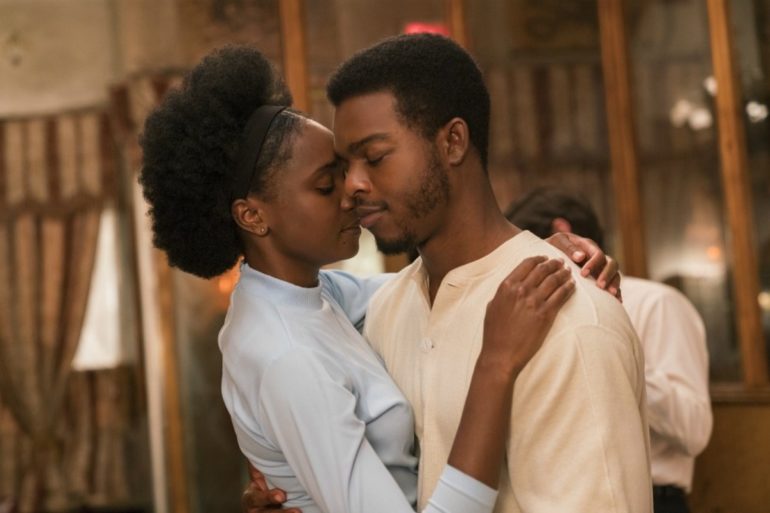Love does not begin and end the way we seem to think it does. Love is a battle, love is a war; love is a growing up.
James Baldwin
Maybe it’s the light, the light that bathes these bodies in fonts of colour, sculpting skin into marble and characters into monuments of love and resilience. Maybe it’s the camera, though restless and hungry it too can pull a face into focus, from faces of grace to those that provoke us. And just when we feel the chorus of strings lifting us toward an indescribable splendor it’s the sound of brass that rumbles, sinking us into melancholy’s familiar melody. If Beale Street Could Talk seeps into the soul in such inexplicable ways. It’s a film which doesn’t shout yet is undeniably clear in what it wants to say. It may not be as bold as its predecessor but daring in its nuanced delicacy where it’s within the expressions of light we find an everlasting warmth.
There’s a certain tenderness radiating through Barry Jenkins’ work to date. From his assured feature debut, Medicine for Melancholy (2008), to his electrifying chronicle of masculinity in Moonlight (2016), the director’s cinema crafts an open hand grasping for a grip in the dark, where characters and audiences alike seek to find a solace in its enchanted embrace. If Beale Street Could Talk (adapted from Baldwin’s book of the same name) continues this approach, taking us all the way back to 1970s Harlem where we follow Tish (KiKi Layne) and Fonny (Stephan James), childhood friends who fall in love as young adults. Inseparable and unwavering, their bond is tested when Fonny is falsely imprisoned for rape. Pregnant with his child, Tish, along with her family, must rally to prove his innocence.
To focus on the film’s plot is to swim against the lyrical current sweeping undertow. It’s only by detaching oneself from the broad strokes that we begin to revel in the many subtle touches rippling throughout the film and soak in the resonance beneath the text. As simple as a knowing glance or a perfectly placed prop, there’s an ever-glowing intimacy flickering between light and shade, one which imbues the camera with a richness of spirit through history’s haunted memory. Our characters are trapped, not only in the cell of circumstance but in the sliver of liberty a shallow depth of field can provide where the frame can seal periphery alongside a familiar fate. Pools of autumn hues fill the screen with cosy palettes of red, gold and green. But the sense of an approaching winter needles through the narrative, and while characters insulate their souls we’re reminded of the inevitable struggle to find hope in a hopeless system.

The score too weaves a bittersweet trance, strings and horns conjure sounds as if forgotten harmonies you’d swear you’ve heard before. But it’s the cast that hit the highest notes, and much like Moonlight, it’s the supporting players whose performances resonate the most. Colman Domingo, as Tish’s father is a joy to watch while Brian Tyree Henry, with only a couple of scenes manages to echo in our minds long after the credits roll. Faces of quiet strength is what we see again and again, closeups that lock eyes and throw away the keys. The way Regina King or KiKi Layne can hold our gaze is both powerful and paralyzing, as if we’ve been drafted into a scene only to miss our cue and all we can do now is look and listen, peeking into the infinite depths of the human face.
Though mesmerizing the film can remain too faithful to the novel at times, leaving dialogue sounding like dialogue, constructed and at odds with the emotional pull of a scene. At Its best it works as a collage of shuffled memories slipping back and forward through time to untangle our preconceptions. When introduced to Fonny we’re not told exactly what crime he has been accused of, Jenkins doesn’t allow us to label him as a criminal but asks us to connect with the boy, the artist, the soon to be father.
That humanist approach is what makes Jenkins’ worlds so compelling. There’s no happy endings here, or climatic twists but a sober reminder that the american dream is a dream deferred for many. A period piece whose themes of racial politics are forever contemporary, If Beale Street Could Talk finds an intimate space between shades of heartbreak, a space where both love and pain coexist to form hope.

